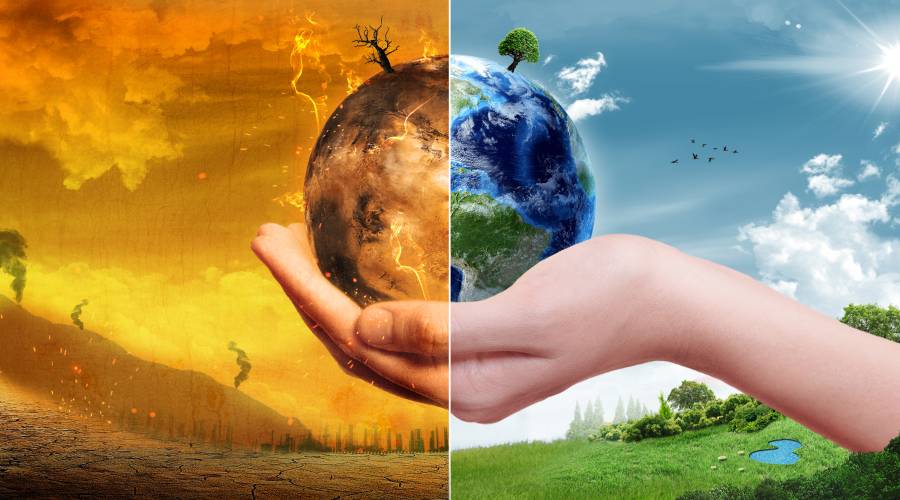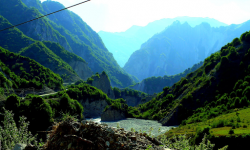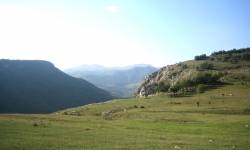
Factors causing global warming and combating them
Our planet is currently warming faster than at any time in human history. Greenhouse gas emissions block the heat from the sun as they surround the Earth.
This also leads to global warming and climate change. Rising temperatures over time change weather conditions and disturb the normal balance of nature. This poses many risks to humans and all other living things on Earth.
If we look at history, we will see that with the discovery of electricity in the 20th century, the use of oil as a fuel decreased to a minimum. But later, with the invention of the automobile, the oil demand increased again, which today is one of the main factors causing atmospheric pollution.
It is well known that oil, gas, and coal are the largest contributors to global climate change, accounting for more than 75 percent of global greenhouse gas emissions and nearly 90 percent of all carbon dioxide emissions.
Researchers have calculated that if the amount of carbon dioxide in the atmosphere doubles, the planet will warm by about 3.6-5 degrees. However, the 2021 IPCC report states that a doubling of carbon dioxide compared to pre-industrial levels will lead to 2-5℃ of warming.
Since 1880, just before the Industrial Revolution, the Earth's average climate has been changing rapidly. It is believed that the Earth has already warmed by 1.2 degrees due to industrial emissions of so-called greenhouse gases. In terms of additional heat and energy, experts have said that a 1.1-degree rise in temperature is equivalent to four Hiroshima bombs exploding per second.
Experts have been predicting for several decades that half of the species on the planet will become extinct due to global warming. We all feel these changes in the last ten years. Why does this happen, what can we do about it, and can we as ordinary people fix it? What is humanity's responsibility in this matter?
Causes of global warming
Global warming is caused by the burning of fossil fuels, which release greenhouse gases such as carbon dioxide into the atmosphere.
Greenhouse gases existed even before the Industrial Revolution. These are volcanic eruptions, forest fires, and even the respiration of living organisms, which is a normal process. In the last century, the influence of the industry has grown so much that the process has begun to accelerate dozens of times. On the other hand, the burning of coal, oil, and gas, deforestation-disruption of the ecosystem, the increase in livestock production with the increase in the world population, artificial consumption, the introduction of excessive amounts of plastic into daily demand, nitrogen oxide emissions from fertilizers, and the emission of fluorine gases from equipment and products.
Consequences of global warming
Experts note that an increase in the temperature of the planet up to 2 degrees will cause a disaster. In general, each decade since the 1980s has been warmer than the previous one. An increase in temperature will cause problems in agriculture, several animal species will perish, and in general, warming will affect all ecosystems. Weather anomalies will worsen in different parts of the planet, which will affect people's lives. Some parts of the world will get less rain, some more, and a third will get the same amount of rain, but more intense and short-lived. Such anomalies will cause droughts and floods. An example of this can be the recent rains in the Sahara desert, which has not received rain for centuries, as well as in some parts of the African continent, and the melting of the Arctic glaciers.
How will this affect us specifically?
Global warming and climate change will certainly have a major impact on people's lives. Global warming will also increase the risk of more people falling into poverty. If not avoided, the following risks will arise:
• Strong thunderstorms and heavy rainfall will cause contamination of water resources, including drinking water sources.
• Drinking water supplies will be unavailable in some places.
• Residences will be damaged by floods or forest fires.
• Working outdoors will become unbearable.
• As the temperature rises, the electricity demand will increase.
• The flowering period will be longer, which may lead to an increase in allergies and asthma attacks.
• As temperatures rise, more people will suffer from heat stroke.
• As temperatures rise, some aircraft will not be able to withstand the heat. So, in the Middle East, which has a hot climate, intercity flights are carried out at night.
What can we do?
• Experts suggest various options for the transition to a green life: switching from cars to bicycles,
• reduce waste;
• traveling on foot or by bicycle;
• eating seasonal products;
• turn off electrical appliances when leaving the house;
• use light textile products to the end;
• talk about greening with friends and at work;
• choose electric transport;
• use non-cash payment;
• prefer more plant foods
• repairing things and giving them a “second life”.
• eliminate plastic from our lives as much as possible.
At the macro level, it is regulated by laws, but at the micro level, the choices each person makes today are very important for the future. The world was our home and it's time to stop neglecting it.






